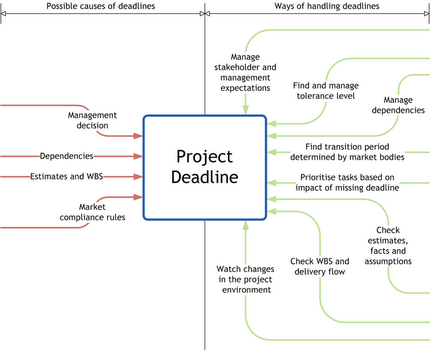Handling tight project deadlines as a business analyst
I’ve talked about ways of managing your work when you’re faced with a tight deadline. This time I’d like to discuss ways of managing the deadline itself.
You can end up with a tight deadline for a variety of reasons. The deadline may be mandated by the management. It can be determined by interdependencies between projects. It can be defined by market compliance rules. In other cases it’s estimated using the work breakdown structure for the project but ends up being too short because of wrong assumptions.
So how can you as a business analyst make sure that circumstances don’t control you and your team, and you deliver your project successfully even if you don’t meet the original deadline?
Here is a visual summary:

I’ll look into ways of managing deadlines in more detail below.
Manage the manager
Management sometimes sets up deadlines with a good “buffer” to allow themselves time for decision making at the end of the project, or because they don’t expect to get results on time and want to push things along by moving the deadline forward. This can be best mitigated by having good communication with the management.
However, what can you do if your manager does set an unreasonably short deadline? Find the tolerance level of your project sponsor (management) and of the key stakeholders who can influence the sponsor. Talk to end users to understand the severity of not delivering on time. There can be scope for negotiation.
Shuffle dependencies
If your deadline is constrained by dependencies, you can talk to project managers of the upstream and downstream projects to get a better understanding of the interconnections. You might be able to find a way to reorganise things and either get what your project needs delivered earlier, or move the deadline for your own project.
Be smart about compliance deadlines
If you’re working on a compliance project, it may have a firm deadline established by the market bodies. In this case find out if there is a transition period. It is usually provided because market participants have differing levels of compliance and don’t have the same resources available to make the transition. You can also evaluate the impact of breaching the deadline (such as fines for non-compliance), and prioritise the parts of the project which would have the highest financial impact if they are overdue.
Double check estimates
When it comes to deadlines defined by estimation, it’s a good idea to double check the estimates. Ask what facts and assumptions were taken into account when the task was initially estimated.
Final note: Watch out for changes
Once the project starts, you have to watch out for changes in the project environment. Changes will affect project completion time, so work with the team and stakeholders to update the WBS and the schedule.

New! We have published a new book: A Navigator to Business Analysis.
Over 400 pages of practical, useful material will help you build your skills and advance your career! Find out more and get free excerpt.
Get helpful BA articles in your inbox
Hone your skills with BA insights (and very occasionally, we may let you know about discounts and specials).